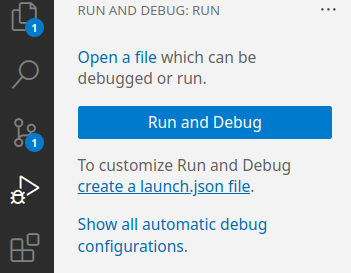We track bugs and issues using Github.
If you find a bug, please open an Issue. When opening an Issue or Pull Request please follow the preconfigured template and take special note of the checkboxes.
If you want to fix a bug, add a new feature or extend existing functionality, please create a fork, create a feature branch and open a PR back to this repo. Please mention open bug issue number(s) within your PR if applicable.
We suggest using Visual Studio Code with the official Go for Visual Studio Code extension.
Go version
This project is currently still using go 1.19. You can follow the installation guide for go here. And you can find go version 1.19 in the archived section here.
Preparing your fork
Clone your fork, create a feature branch and update the depedencies to get started.
git clone git@github.com:<YOUR_FORK>/oauth2-proxy
cd oauth2-proxy
git branch feature/<BRANCH_NAME>
git push --set-upstream origin feature/<BRANCH_NAME>
go mod download
Testing / Debugging
For starting oauth2-proxy locally open the debugging tab and create the launch.json and select Go: Launch Package.

{
"version": "0.2.0",
"configurations": [
{
"name": "Launch OAuth2-Proxy with Dex",
"type": "go",
"request": "launch",
"mode": "auto",
"program": "${workspaceFolder}",
"args": [
"--config",
// The following configuration contains settings for a locally deployed
// upstream and dex as an idetity provider
"contrib/local-environment/oauth2-proxy.cfg"
]
},
{
"name": "Launch OAuth2-Proxy with Keycloak",
"type": "go",
"request": "launch",
"mode": "auto",
"program": "${workspaceFolder}",
"args": [
"--config",
// The following configuration contains settings for a locally deployed
// upstream and keycloak as an idetity provider
"contrib/local-environment/oauth2-proxy-keycloak.cfg"
]
}
]
}
Before you can start your local version of oauth2-proxy, you will have to use the provided docker compose files to start a local upstream service and identity provider. We suggest using httpbin as your upstream for testing as it allows for request and response introspection of all things HTTP.
Open a terminal and switch to the contrib/local-environment directory.
- Dex as your IdP:
docker compose -f docker-compose.yaml up dex etcd httpbin - Keycloak as your IdP:
docker compose -f docker-compose-keycloak.yaml up keycloak httpbin
The username for both is admin@example.com and password is password.
Start oauth2-proxy from the debug tab and open http://oauth2-proxy.localtest.me:4180/ for testing.